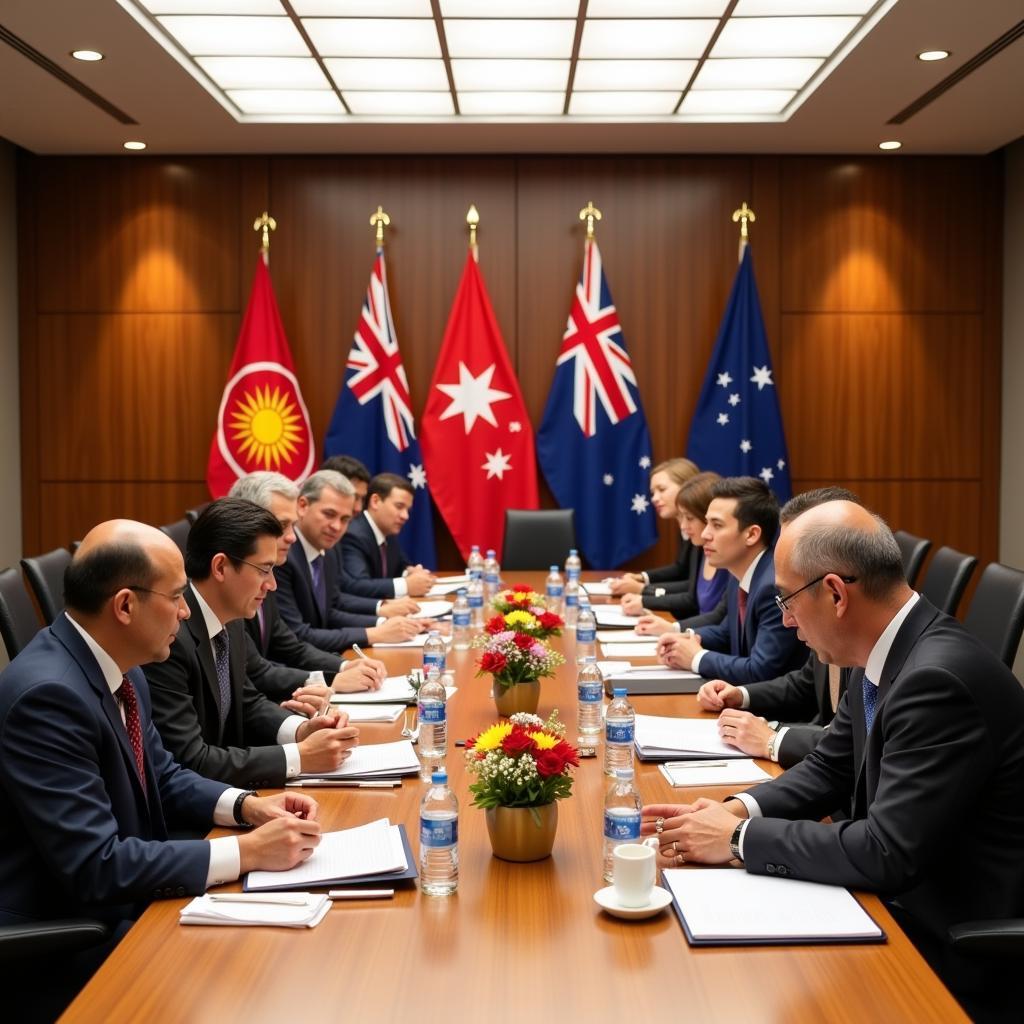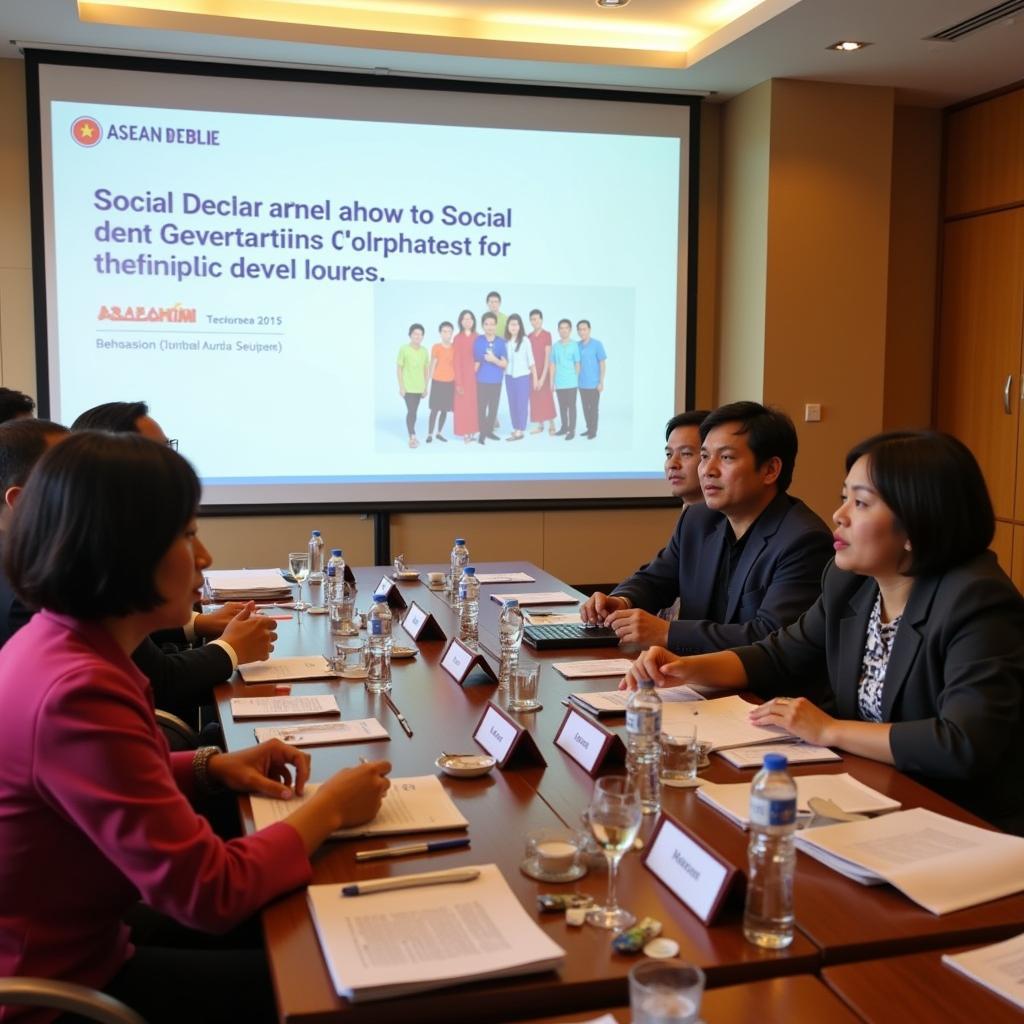The Asean Australia Council (AAC) plays a vital role in fostering a strong and enduring partnership between Australia and the nations of Southeast Asia. This article delves into the significance of the AAC, exploring its history, objectives, and impact on various sectors. We’ll examine how the AAC strengthens diplomatic ties, promotes economic cooperation, and facilitates cultural exchange, ultimately contributing to a more prosperous and interconnected region. We’ll also address some frequently asked questions about the council.
The Importance of the ASEAN Australia Council in Regional Diplomacy
The AAC serves as a crucial platform for dialogue and collaboration between Australia and ASEAN member states. It allows for open communication and the development of shared strategies on key regional and global issues. The council’s work is instrumental in maintaining peace, security, and stability in the region. It helps to address common challenges, such as climate change, transnational crime, and promoting sustainable development. The AAC also plays a key role in advancing regional economic integration. For businesses looking to expand into the Australian market, the ASEAN Business Council Australia offers valuable resources and support.
 ASEAN Australia Council Diplomatic Meeting
ASEAN Australia Council Diplomatic Meeting
Promoting Economic Cooperation through the AAC
The AAC actively promotes trade and investment between Australia and ASEAN. By facilitating business partnerships and removing trade barriers, the council helps to stimulate economic growth and create job opportunities in both regions. It also encourages collaboration in areas such as infrastructure development, technology transfer, and skills development. This focus on economic cooperation helps to strengthen the overall relationship and build a more prosperous future for all involved. It’s interesting to consider how initiatives like the ASEA US partnership could potentially influence or complement the AAC’s economic strategies.
Cultural Exchange and People-to-People Links
Beyond diplomacy and economics, the AAC recognizes the importance of cultural exchange in building strong and lasting relationships. The council supports a variety of programs and initiatives that promote understanding and appreciation between Australian and Southeast Asian cultures. These include educational exchanges, artist residencies, and cultural festivals. Such programs help to foster people-to-people links and build bridges between communities. Initiatives like the ASEAN Australia Youth program are vital in fostering these connections and building future leaders.
What are the main objectives of the ASEAN Australia Council?
The AAC’s main objectives are to enhance political, economic, and socio-cultural cooperation between Australia and ASEAN. This includes promoting regional stability, facilitating trade and investment, and fostering people-to-people links.
How does the AAC contribute to regional security?
The AAC contributes to regional security by providing a platform for dialogue and cooperation on security challenges such as terrorism, transnational crime, and maritime security. It supports initiatives aimed at building trust and confidence among member states. Could local initiatives like ASEA Wollongong contribute to building a stronger understanding between communities?
What is the future direction of the ASEAN Australia Council?
The AAC is committed to further strengthening the ASEAN-Australia partnership by exploring new areas of cooperation, deepening existing ties, and adapting to the evolving regional landscape. Past collaborations, like those from ASE June 2022, provide a solid foundation for future initiatives.
Conclusion
The ASEAN Australia Council is a vital institution that plays a critical role in fostering a strong and enduring partnership between Australia and Southeast Asia. By promoting dialogue, facilitating cooperation, and building bridges between communities, the AAC contributes to a more secure, prosperous, and interconnected region. The council’s ongoing efforts are essential for navigating the challenges and opportunities of the 21st century and ensuring a brighter future for all.
FAQ
- What does AAC stand for? AAC stands for ASEAN Australia Council.
- When was the AAC established? The AAC was established in 1974.
- Who are the members of the AAC? The AAC consists of representatives from Australia and the ten ASEAN member states.
- What are the key areas of focus for the AAC? The AAC focuses on political, economic, and socio-cultural cooperation.
- How does the AAC promote economic cooperation? The AAC promotes economic cooperation through trade facilitation, investment promotion, and support for business partnerships.
- What is the role of the AAC in cultural exchange? The AAC supports programs and initiatives that promote cultural understanding and exchange between Australia and ASEAN.
- How can I get involved with the AAC? Information on engagement opportunities with the AAC can be found on their official website.
Common Scenarios and Questions
Scenario: A business owner in Vietnam wants to export goods to Australia. Question: How can the AAC assist me with market access and regulatory requirements?
Scenario: A student from Indonesia is interested in studying in Australia. Question: Are there scholarships or exchange programs offered through the AAC?
Scenario: A non-profit organization in the Philippines wants to collaborate with Australian counterparts on a community development project. Question: How can the AAC facilitate this partnership?
Further Exploration
For more information on related topics, consider exploring resources on ASEAN economic integration, Australia’s foreign policy in Southeast Asia, and cultural diplomacy initiatives in the region.
For any further assistance, please don’t hesitate to contact us:
Phone Number: 0369020373
Email: [email protected]
Address: Thon Ngoc Lien, Hiep Hoa, Bac Giang, Vietnam.
We have a 24/7 customer support team.


